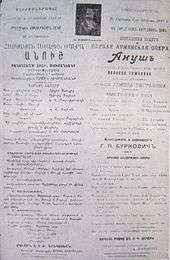Anoush
 Anahit Mekhitarian as Anoush |
 Original poster for Anoush (1912) |
Anoush (also Anush, Armenian: Անուշ) is a five-act opera composed by Armen Tigranian, based on the homonymous poem written by Hovhannes Tumanyan in 1892. Originally composed in 1912, it was first performed in Alexandropol, but it had to wait until 1935 for its full professional staging at the Armenian National Opera Theater. Until nowadays, Anoush remains in the repertoire of the theater.
The opera has special importance to Armenian musical history as one of its most significant accomplishments. Being a work of national character, Anoush was the first opera truly inspired by Armenian folk music and culture, and it is perhaps the most popular Armenian musical and theatrical work.
The opera is about the tragedy of a peasant girl (Anoush) whose short love affair ends in loss and death because of conflict between her lover (Saro) and her brother (Mossy).
Plot
The tragic love story is set in a typical 19th century Armenian village. Anoush is a young village woman who falls in love with a shepherd, named Saro. One evening, at a village wedding celebration, Mossy, Anoush's brother, and Saro fight in a friendly wrestling match. However, instead of letting Mossy win, as is the prevailing custom, Saro violates the local code of honor and humiliates him by pinning him. Enraged, Mossy vows to destroy Saro, who is now his enemy. Eventually, Mossy shoots Saro dead, and from this loss, Anoush becomes insane with grief, and ends her life by throwing herself off a cliff.
See also
References
- Opera: Anoush, Classic of Armenia, in Detroit by John Rockwell, The New York Times, 2 November 1981